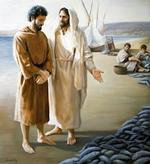Catechism of the Catholic Church
Share this paragraph of the Catechism:
Paragraph:
472 This human soul that the Son of God assumed is endowed with a true human knowledge. As such, this knowledge could not in itself be unlimited: it was exercised in the historical conditions of his existence in space and time. This is why the Son of God could, when he became man, "increase in wisdom and in stature, and in favour with God and man", 101 and would even have to inquire for himself about what one in the human condition can learn only from experience. 102 This corresponded to the reality of his voluntary emptying of himself, taking "the form of a slave". 103
Move forward or back a paragraph: Previous | Next
Where this paragraph appears in the Catechism:
TABLE OF CONTENTS
» |
PART ONE: THE PROFESSION OF FAITH |
» |
SECTION TWO: THE PROFESSION OF THE CHRISTIAN FAITH |
» |
CHAPTER TWO: I BELIEVE IN JESUS CHRIST, THE ONLY SON OF GOD |
» |
ARTICLE 3: "HE WAS CONCEIVED BY THE POWER OF THE HOLY SPIRIT, AND WAS BORN OF THE VIRGIN MARY" |
» |
Paragraph 1. The Son of God Became Man |
» |
IV. HOW IS THE SON OF GOD MAN? |
Notes for the above paragraph:
101 Lk 2:52.102 Cf. Mk 6:38; 8:27; Jn 11:34; etc.
103 Phil 2:7.
English Translation of the Cathechism of the Catholic Church for the United States of America © 1997, United States Catholic Conference, Inc.






